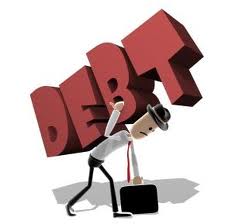 I often get the question of whether or not there is a certain amount of debt that somebody needs to have before they can file a bankruptcy. The answer is that there is no minimum amount of debt that is required to file a bankruptcy. The amount of debt that would justify a bankruptcy filing depends on many factors, for example:
I often get the question of whether or not there is a certain amount of debt that somebody needs to have before they can file a bankruptcy. The answer is that there is no minimum amount of debt that is required to file a bankruptcy. The amount of debt that would justify a bankruptcy filing depends on many factors, for example:
1) How much does the debtor earn?;
2) What is the likelihood that the amount of money that the debtor is earning will increase enough within a reasonable time to pay off their debt?;
3) What are the minimum payments that they debtor is currently paying? (minimum payments mostly just pay interest, so if monthly minimum payments are high and there is no realistic chance that the debtor will be able to significantly increase their payments, then a bankruptcy could make a lot of sense).
In addition to the above, every individual has a different psychological threshold with what is a comfortable amount of debt to maintain. For some people, $10,000 could be an uncomfortable amount of credit card and/or medical debt. For other people, their personal threshold could be higher or a lot higher. There are practical considerations and psychological considerations in choosing whether a bankruptcy filing is the right course for an individual. The tangible considerations will include: whether the debtor is currently being garnished (or imminently facing a garnishment); is there a foreclosure on the horizon; and how much money per month the minimum payments on the debt are (remember minimum payments on the debt are not doing much towards paying against the principal). The intangible considerations will be focused on the psychological benefits of getting rid of a lot of debt and having a fresh start.
I’ve seen it many times with my clients the significant psychological change with them from when I first see them to when their case is filed to when their case is finished. Often my client is significantly happier and more productive after their bankruptcy is filed and certainly after the case is finished—because a lot of debt that was psychologically weighing them down is now forever gone. Indeed some of my clients that I’ve seen a year or more after their bankruptcy filing literally appear to be an entirely different person (a much happier, focused, and productive person).
After the bankruptcy is filed creditors are no longer allowed to harass the debtor with daily (sometimes multiple calls per day) phone calls, letters, threats of lawsuits, and/or actual lawsuits (with the resultant garnishments and levies that will follow). And getting rid of this daily harassment from creditors is a huge consideration. One of my main motivations for being a bankruptcy attorney is to help empower people. And the results that I’ve seen with my clients that have gone through the bankruptcy process confirm that for a lot of people filing a bankruptcy can be a powerful tool to help get them on a more successful path.
As always, every individual’s situation is unique and it is really necessary to sit down with an experienced Portland bankruptcy attorney to discuss and analyze your options. And for various reasons, a bankruptcy filing may not be the best option for an individual’s unique situation (for example, too much non-exempt equity in a house or other assets). I am always happy to discuss your situation with you, answer your questions, and clearly explain to you all of your options. Feel free to call my office to schedule an appointment.




